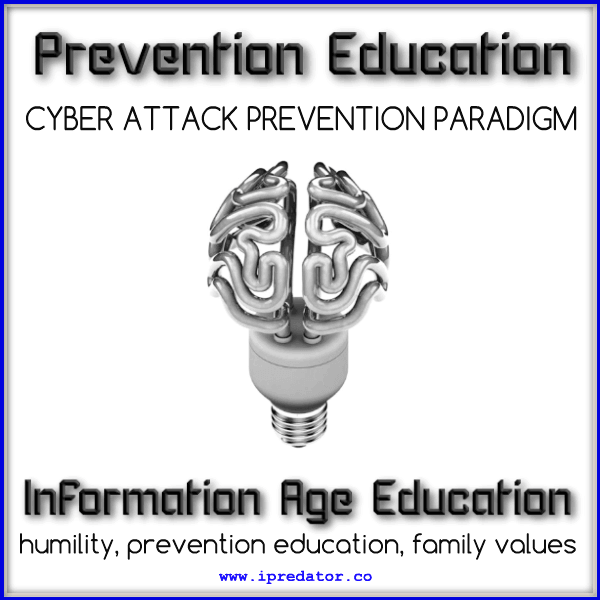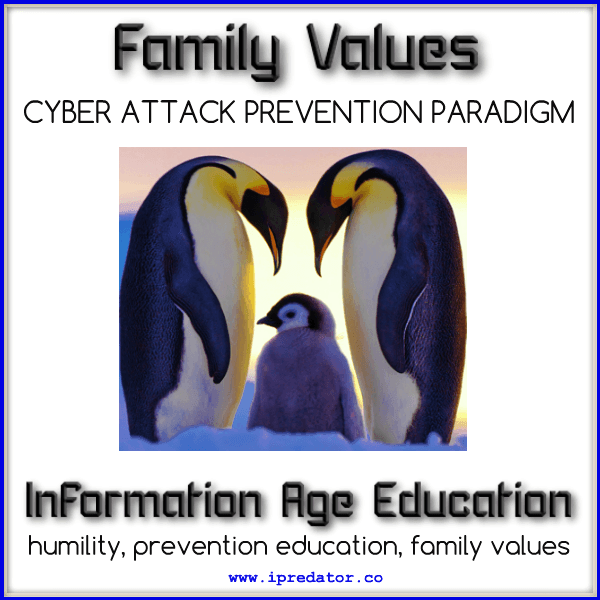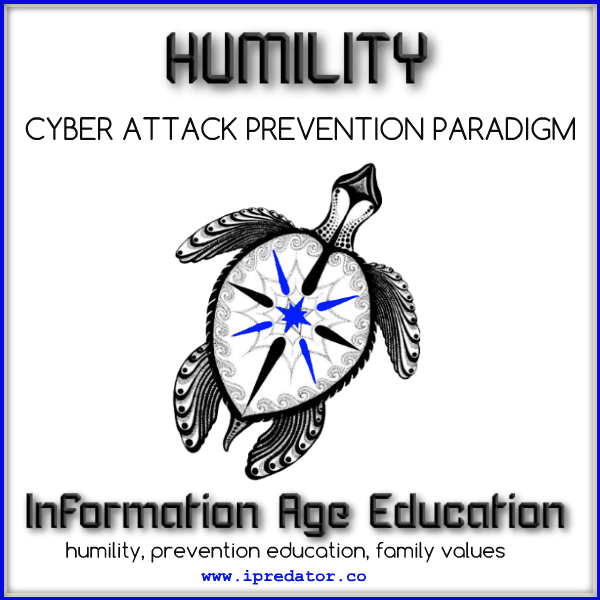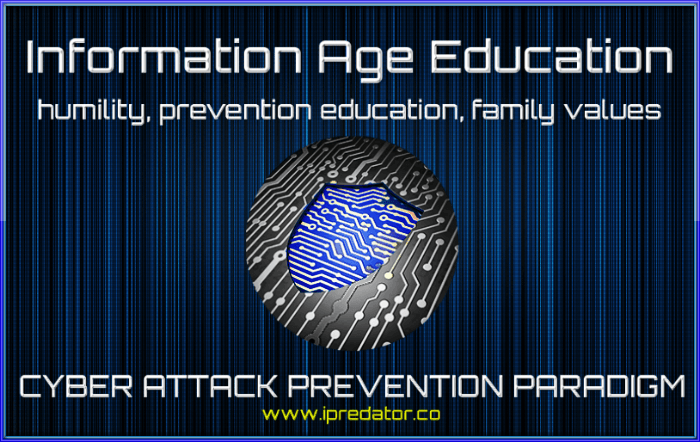Information Age Education (IAE)
A Cyber Attack Prevention Concept
Authored by
Michael Nuccitelli, Psy.D.
Information Age Education (IAE): Information Age Education (IAE) is a cyber-attack prevention paradigm offering a resolution to reducing the negative consequences of living in the Information Age. Information and Communications Technology presents positive and negative influences upon humanity, in which the negative aspects grow at a feverish pace. Cyberbullying, cyberstalking and online sexual predation are just a few of these destructive forces. IAE prioritizes prevention education, non-denominational family values, and humility as solutions to connecting the disconnected and educating the ignorant. IAE is an educational concept, not just for children of the Information Age, but all online users.
The Information Age is a societal paradigm that emerged in the last quarter of the 20th century and is thriving in the second decade of the 21st century. The Information Age is a stage in societal and technological development like the Industrial Revolution (1750-1942). The Information Age represents the evolution, emergence, consumption of, and reliance upon Information and Communications Technology (ICT). ICT and its subsequent impact upon humanity have brought forth an Information Revolution. Mobile device technology, telecommunications, social media, and the artificial universe of cyberspace are just a few examples of humanity’s newest frontiers.
The United States and all industrialized nations are experiencing a rapid societal and economical shift from traditional industry, born and bred out of the Industrial Revolution, to that of an economy based on the instantaneous acquisition of vast amounts of information affording the opportunity to create, manipulate, and disseminate information to a vast audience. Although the concept of “information” has infinite applications, it remains restricted to what is referred to as the “Information Manipulation Triad”.
At present, the Information Manipulation Triad assumes that all information can be acquired, disseminated or exchanged. The Information Manipulation Triad is how all information, ad infinitum, is manipulated, perceived, and experienced. Within the parameters of the Information Manipulation Triad is where Humanity, with the help of Information and Communications Technology (ICT), has created the abstract and artificial environment known as cyberspace.
Cyberspace, the Internet and the World Wide Web are synonymous terms, defining an abstract and artificial electronic network in which information is acquired, disseminated, or exchanged. It is the speed and magnitude of available information, within cyberspace, that has triggered a new awakening or revolution called the Information Age. Just as the Industrial Revolution drastically altered how people lived, worked, and interacted with one another, the Information Revolution has had a significant impact upon our nation serving as a catalyst for change in both the present and future.
Unlike the Industrial Revolution, which inarguably had an immense impact upon society and the world, the change that occurred during the Industrial Revolution came about more gradually. In comparison, the Information Revolution has been a rapid catalyst bringing forth radical shifts in society’s social, economic, and psychological perceptions and reality. While the Information Revolution is proving to be a major milestone in humankind’s developmental journey, it has had an equal, if not greater impact upon humanity as a whole.
Initially, it seems that society primarily extoled the benefits of ICT, in the early years of the Information Revolution, unaware of the hidden dangers resembling a proverbial technological Pandora’s box. Humanity, once again, has been seduced by the notion that bigger is better, or in this case, more technology equates a better quality of life, while it has ignored the overwhelming evidence that the darker side of ICT and the subsequent fallout that are threatening to overshadow positive aspects of ICT.
Cyberspace
A Surreal Technological Bubble
The concepts of being “connected” and striving for increasing “transparency” via ICT paradoxically makes humanity less connected to what is really happening both locally and globally. As humanity increasingly becomes technocentric, fewer citizens are attempting to connect or establish relationships with other individuals living within arm’s reach, with most people choosing to “connect” with other humans in cyberspace using ICT. It seems that humanity is slowly disconnecting from one another, isolating itself within a surreal technological bubble, and shunning human contact on both literal and spiritual levels.
Information technology experts, sociologists, and psychologists tend to describe ICT as beneficial tools for humanity. Investigative findings, research, and observation have led to the discovery and creation of iPredator and the iPredator Bridge, which defines this new dimension in quite a different light. Although the World Wide Web, Telecommunications, and Mobile Device Technology are highly beneficial tools that can be of great benefit to society, it is also recognized that “tools” have many different purposes. When chosen for nefarious reasons, ICT are tools that become weapons, they become dark, and without boundaries and a moral structure, the “tools” become a detriment to humanity.
As ICT continues to expand at a feverish pace, coupled with daily introductions of modern technology, ever-increasing obstacles will challenge humanity. Already, online users have been confronted by an ever-increasing threat of having little or no personal privacy. Incredible amounts of information, can be obtained, exchanged, and spread at an astonishing speed. Another challenge, which incorporates the darker side of humanity, is the usage of ICT and cyberspace to harm others, inflicting psychological, physical, and/or societal damage.
iPredator
The Dark Side of Cyberspace
The four constructs of iPredator are defined as iPredator, iPredator Bridge, Cyberstealth, and Dark Psychology. These four theories are the driving force as to why Information Age Education (IAE) is vital to humanity as a majority of the population is quickly becoming overwhelmed by information technology and cyberspace.
IAE is a concept describing a person’s conscious awareness and understanding of living in the Information Age. Given that humanity thrived during the first century of the Information Age; IAE accepts there lies both benefits and detriments yet to be discovered. IAE assumes awareness, prevention education, family values, and humility are vital to reconnecting the disconnected, educating the ignorant, and conquering the corrupt (aka iPredator).
IAE assumes that, along with the plethora of gifts and benefits information technology offers society, the dark side of cyberspace has ensnared an ever-growing number of the online citizenry. IAE suggests that people of all ages are migrating towards a state of disconnectedness, shying away from tangible interpersonal relationships, pro-social mores, family values, humility and basic kindness. IAE asserts that the only way to thwart the disintegration of disconnectedness is by awareness and cyber-attack prevention education.

PREVENTION EDUCATION
Prevention education is defined as a community’s proactive approach to minimizing and/or preventing potential negative events, experienced by community members, via educating them about the negative outcomes of their cyber behaviors and beliefs and focusing on the benefits of practicing adaptive and healthy behaviors (aka, Internet Safety). Prevention education is the only solution to helping present and future generations break the growing trajectory of falling into the proverbial abyss of interpersonal disengagement.
Not only are disconnected people more apt to engage in criminal, deviant, deceptive, dysfunctional and self-destructive behaviors, but they also become exponentially more vulnerable to being targeted by iPredators, and offline criminals and/or assailants. The harbingers of Information Age Education are educational systems for children and young adults, religious organizations and healthcare professionals for families and pro-social public figures for adults. Equally important to prevention education is the return and reinterpretation of family values and the practice of humility.

FAMILY VALUES
In relationship to Information Age Education, family values are defined as “the political and social beliefs that hold the nuclear family to be the essential unit of society”. (Wikipedia) The IAE definition of “family values” is apolitical, irreligious, and not bound by any specific philosophic assumptions, culture, race, or gender bias. Strong and consistent family values are necessary for building trust and confidence in each family member.
Family Values are the hallmarks of IAE and consist of respect, forgiveness, responsibility, traditions, generosity, and patience. When family values are ingrained into a child, he/she has a higher probability of growing up to be a highly functioning adult, connected to his/her community, and insulated from becoming either an online assailant or victim.

HUMILITY
The third tenet of IAE puts forth, as the solution to Information Age societal disconnectedness, is the emphasis and practice of humility. Humility, as defined by Merriam-Webster is “the quality or state of not thinking you are better than other people and the quality or state of being humble”. More than any other moral, value, or philosophical ideology that a person can embrace, the concept of humility seems to be the direct target for extermination by cyberspace and Information Technology.
The concept of Humility is practiced and encouraged by all religious dogmas and is equally supported by agnostic and atheistic segments of society. There are few adults walking the face of the Earth who disagree with the practice of humility, as this quality is upheld as being one of the most pro-social qualities an individual can possess.
IAE staunchly recommends the practice of cyber-attack prevention education, internet safety, family values, and humility. As previously mentioned, an integral if not the foremost component in the goal of slowing the trajectory of the societal disconnection process, is the active participation of educational systems, religious organizations, service organizations, and positive pro-social public figures. Although it is impossible for any person, group or nation to be absolutely insulated from being cyber attacked or targeted for nefarious and malevolent reasons, the odds and probability thereof can certainly be reduced through IAE. Provided here are free cyber-attack prevention assessments authored by Dr. Nuccitelli.
Free Edu. iPredator Inventory Links
- iPredator Probability Inventory – 330 (IPI-330)
- iPredator Probability Inventory – Adult (IPI-A)
- iPredator Probability Inventory – Business (IPI-B)
- iPredator Probability Inventory – Cyberbully (IPI-CB)
- iPredator Probability Inventory – Cyberbully Abuser (IPI-CBA)
- iPredator Probability Inventory – Cybercrime (IPI-C)
- iPredator Probability Inventory – Cyberstalking (IPI-CS)
- iPredator Probability Inventory – Educator (IPI-E)
- iPredator Probability Inventory – Internet Predator (IPI-IP)
- iPredator Probability Inventory – Pediatric (IPI-P)
- iPredator Probability Inventory – Psychologist (IPI-PSY)
- iPredator Probability Inventory – Teen (IPI-T)
Free Edu. iPredator Checklist Links
- Adult Internet Safety Checklist (AISC)
- Business Internet Safety Checklist (BISC)
- Cyberbully Abuser Checklist (CBAC)
- Cyberbullying Target Checklist (CBTC)
- Cybercrime Protection Checklist (CCPC)
- Cyberstalker Identification Interview (CSII)
- Cyberstalking Prevention Checklist (CSPC)
- Digital Reputation Protection Checklist (DRPC)
- Educator Internet Safety Checklist (EISC)
- Internet Safety Checklist Psychologist (ISCP)
- Online Predator Prevention Checklist (OPPC)
- Parent Cyber Safety Checklist (PCSC)
- Pediatric Internet Safety Checklist (PISC)
- Teen Internet Safety Checklist (TISC)

Michael Nuccitelli, Psy.D.
Michael Nuccitelli, Psy.D. is a NYS licensed psychologist, cyberpsychology researcher and online safety educator. In 2009, Dr. Nuccitelli finalized his dark side of cyberspace concept called iPredator. Since 2010, he has advised those seeking information about cyberbullying, cyberstalking, cybercriminal minds, internet addiction and his Dark Psychology concept. By day Dr. Nuccitelli is a practicing psychologist, clinical supervisor and owner of MN Psychological Services, PLLC. After work and on the weekends, he volunteers helping online users who have been cyber-attacked. Dr. Nuccitelli’s is always available to interested parties and the media at no cost. This website and everything created by Dr. Nuccitelli is educational, free and public domain.
